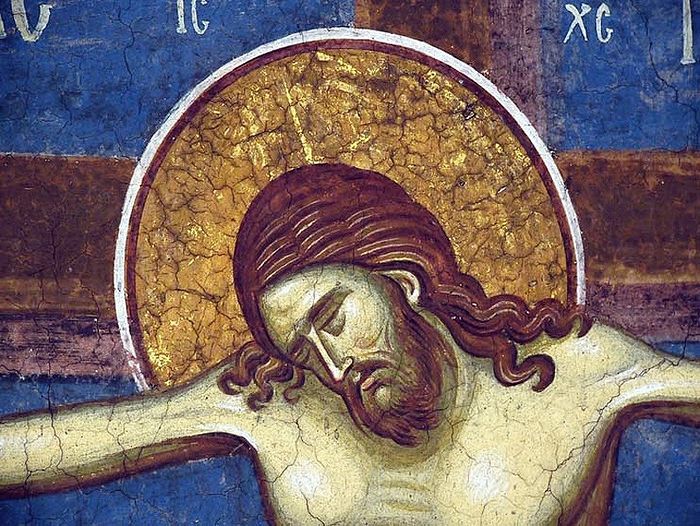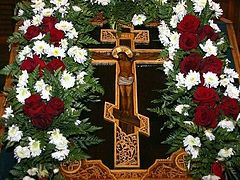Not in flowers and gold, not in silver and precious stones is found the value of the Cross, but in the wounds of the Lord and His Most Pure Blood shed for us. Therefore, when we see the Holy Cross, look not at its adornments, but look at the drops of blood sanctifying it; think of the tears dampening it for two thousand years, and remember our fathers who kissed it with such faith and reverence!
This is the true value of the Cross, and this is what I would like to talk about today—that is, about suffering and its meaning on Earth.
If the word “cross” means suffering, then to suffer means to take up your cross and follow after Christ (cf. Mk. 8:34) your entire life, on the path of virtues and repentance; it means to sacrifice yourself for the sake of your children, for the sake of the salvation of those who are in danger, for the sake of correcting the fallen; it means to endure unjust offenses from our brothers, it means to be co-crucified with Christ—on the same hill, on the same cross, and for the same ideal.
As for the meaning of suffering in the life of Christians, it is immeasurably great. None can be saved without difficulty, without tears, without suffering. None can see Christ if he will not follow after Him, if He will not touch His wounds, if he will not bear His Cross. This is the meaning of suffering. Without it there is no salvation.
As closely as the human soul is connected with the body, so is suffering with human life. Separate the soul from the body and the man dies; separate suffering, that is, sorrow, from the life of a Christian, and this believer will increasingly drift away from Christ, from salvation. This is the meaning of suffering!
And if someone says, “If Christ suffered for us once, why should we suffer in this life?” Yes, we must suffer together with Him! He suffered for our sins, but did not remove from us the gift of suffering! For suffering is a cross, it’s a gift, it’s redemption, it’s a place of testing, it’s a mercy which the Lord offers to every human soul. And if this life is a vale of tears, then suffering is a ladder, more reliably leading people out of this miserable abyss.
Jesus Christ suffered for us, but He calls us, saying, Whosoever will come after me, let him deny himself, and take up his cross, and follow me (Mk. 8:34). He endured much for us, but exhorts us to the same patience, saying, In the world ye shall have tribulation: but be of good cheer; I have overcome the world (Jn.16:33). He laid down His soul for us, but exhorts us to the same sacrifice, saying, Whosoever shall lose his life for my sake and the Gospel's, the same shall save it (Mk. 8:35).
Thus, if the Pastor suffered, then His sheep must suffer. If our Bridegroom offered Himself as a sacrifice, then we who are called to the marriage must offer ourselves in sacrifice. If Christ died for our salvation, then we will give our whole lives for His love. Love is expressed by love. Suffering is repaid with suffering.
Such is the cross of life, and such is the path of the cross. Whoever avoids the path of the cross, whoever wants to reach Paradise without suffering, without sorrow, the same is a thief and a robber, and God will give him his lot with thieves. Let us remain with Christ. Wherever He is, there we will be, as the great Paul exhorts us, saying, Be ye followers of me, even as I also am of Christ (1 Cor. 11:1).
And where is Christ? Christ is lying in the poor manger; Christ is persecuted by Herod; Christ is humbling Himself before Joseph of Nazareth; Christ has nowhere to lay His head; Christ is among the leprous; He is on the way to the sick; Christ is threatened with stoning; the Pharisees hate Him; He is reproved by the scribes; He is considered a servant of satan; He is betrayed by His disciple; He is abandoned by the apostles; He is beaten and spat upon; He is led to Golgotha; He is crucified on the Cross in the midst of two thieves. Thus, wherever our Savior is, there will we His followers be!
But suffering has another meaning: It is our best teacher and instructor. Deprivation, sorrow, pain, every kind of suffering—it all speaks to us of Christ, reminds us of church, of death, and the coming Judgment. Above all, suffering humbles a Christian, teaches him to pray, forgives his brother, leads him to church more often, evokes tears of repentance, gives the strength to fast, and encourages him to confession.
Suffering is the most daring apostle of all time. It silently preaches Christ, for wherever the word of the Gospel does not enter, there is the cry of suffering. Wherever the apostolic voice is not heard, the groan of suffering is heard. Wherever a priest cannot enter, there is sorrow, and whatever a priest cannot do, suffering does.
He who was a stranger to the Church before this now asks about it. He who laughed at a priest now humbles himself and looks for him. He who had no time to pray now calls upon God day and night. He who did not open the door to Christ now opens it to the poor. He who did not hear the church bells now, chased by the sorrows of life permitted for him by God in moderation, now always hurries to church, opens its door, and crosses its threshold with wholehearted faith…
How great the benefit of suffering is in Christianity! Moreover, suffering is often sent to a man as an atoning penance for his sins. He who does not turn to repentance through suffering, abiding in happiness and satisfaction, can never be saved.
Additionally, suffering cleanses a person, makes him firmer in his faith, more courageous in temptations, more patient in troubles. As the wind makes an oak strong, as the sea’s waves make a shipmaster experienced, as a storm makes an eagle nimble, and fire makes silver pure, so sorrow makes a Christian skillful. Let me give you a small example.
Have you seen incense? No one knows about it while it’s lying in the drawer. But if you put it on a glowing coal, it fills the house with its sweet fragrance. And while basil is just lying on the shelf, it barely smells, but if you crush it, its scent spreads everywhere.[1] It’s the same with a Christian. Inexperienced, he has no great value, but tried in the fire of temptations, he becomes an image of patience for everyone, and is accounted worthy of great crowns in Heaven; because from sorrows comes patience, from patience experience, from experience hope, and hope does not disappoint (cf. Rm. 5:3-5). St. Isaac the Syrian says that the grace of the Holy Spirit descends upon us according to the measure of the sorrows we endure.
But suffering, as the crowning of a man bearing his cross, gives birth in his heart to great Divine joy. As a mother grieves during the travails of birth-giving but then rejoices because a man has been born into the world (cf. Jn. 16:21), so does a Christian. During his trials, in the flames of sickness, in the storm of temptation, he does not experience any particular joy; but when the sorrow passes he rejoices in spirit, for he was able to bear the Cross of Christ.
Great was the joy of the holy apostles and martyrs who suffered for Christ, and great should be our joy when God visits us with afflictions. For he who does not suffer here for a short time will suffer there eternally.
Pleasure and satiety bring every sin into the home, but suffering brings Christ. Pleasure drives Christ from the heart, but sorrow makes Him our friend. Pleasure fertilizes the weeds of sin, but suffering brings forth the lily of salvation.
Beloved faithful, let us love suffering, for it makes us friends of Christ. Let us hate pleasure, inasmuch as it deprives us of His love. Let us go where our Pastor is. And if He punishes us and convicts us, let us endure all for the sake of our salvation. He will never tempt us beyond our strength, but rather He will give us the gift of patience and the crown of salvation according to the measure of our sorrow.
If someone has troubles beyond his strength, it means he has the heaviest of sins and he is deprived of His mercy. But let us be bold, for the Lord will not permit the rod of sinners upon the lot of the righteous (Ps. 124:4). Above all, we, Christians, are given not only to believe in Christ, but to suffer for Him (cf. Phil. 1:29).
Thus, we Christians suffer because we want to follow Christ. We suffer because through suffering our multitude of sins is forgiven. We suffer because suffering teaches us to pray, to unite with each other, and to place our hope in God alone. We suffer because we want to be an example for others in salvation. We suffer because sorrow brings joy to our souls. We suffer because it is the sole path leading to Heaven. All other paths lead to destruction.
Let each bear his cross that he himself chose or that the Lord assigned him. But whoever seeks for another cross, a lighter one, is like Judas the betrayer, the forsaken of the Lord. Let us remain there were Christ is: at our children’s cradle, at the bedside of the sick, in the fire of temptation, in the podvig of good works. There we will see the scourged face of the Lord, His pierced hands and rib, His brow, bloodied for our sake. For the furnace of temptation purified the saints, but the wounds of the Cross have begotten for us the spirit of salvation.
The holy Gospels were written in blood. So many of the holy Epistles were written in chains. The Church was founded in persecutions, passing through earthly abysses and attacks until our times. Let us, Her children, walk this same path.
We Christians are not born of fornication, but we are sons of the Light, redeemed at the price of innocent blood. Neither are we orphans abandoned by our parents. Our Father is God, and our Mother is the Church; let us listen to our Father and Mother.
Neither are we lost sheep, not finding any meaning in this life—we are the sheep of the flock of Christ, and He is our Good Shepherd Who surrendered His soul for us. We are God’s, and we need no hirelings. We have the Archpastor, Who, out of love, desired to suffer for us (Heb. 4:15). Let us endure any sorrow for the sake of His love, that His sheep might be there with their Pastor!





